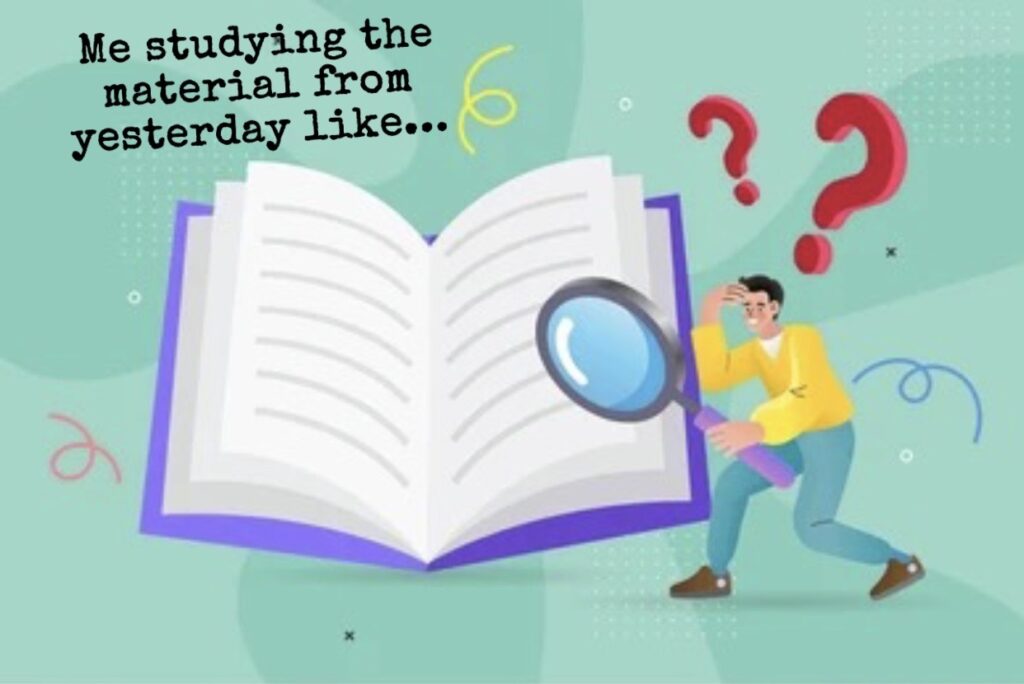By Nataly Rodriguez

As an incoming freshman studying is the one skill, I hoped you learned in high school but if not here is an idea of how to study!
Use the recency effect! Now you may be wondering what exactly that is but let me explain slowly. The recency effect is the tendency to remember most recently presented items (1). Now an example of this is if you are trying to remember a list of items it is most likely you remember the items you last studied (1). Now using this effect can help move items in short- term memory to a longer-term memory. You would have to constantly revisit the items the same way you learned them.
The recency effect would be like a backward-looking process that results in access to the most recent of those events (2). You are more likely to recall what you learned at the end of class 20 minutes after class ends than you are to recall what you learned in the begging of class. Recency effects happen because end of lists items tend to possess more identifying features (3). When using this study skill, you want to use your “inner voice”; Any list of items presented, regardless of auditory or visual is coded by speech (3). When these events are presented to us, we are most likely to remember them when they were told to us.
So, if they were auditory by our professor, we are better off remembering it in our head how the professor said it. Where if it is visual we will repeat the words in our head and when we recall we will remember it how it was repeated in our head. In auditory recency a list presented aloud produces near perfect performance on the last one or two items (3). You would remember the last words exactly how they were said to you leading to a successful recency recall.
Another example of how recency works is recalling where you parked at the end of the day. In a study it was shown that people who park infrequently at a location were quite accurate in remember where they had parked when tested a month later (4). Compared to those that would park in that location daily, they wouldn’t remember if asked a month later where they had parked that day (4). When studying we can apply this, we need to constantly review what we recently learned to move it into a longer-term recency. Say we got a new set of vocabulary at the beginning of the week, and we focused on the professor reviewing the first half we would practice those words until the next class because it is the most recent thing we have learned after practicing it would move into a longer- term recency. Now when leaning the second half we just focus on remembering that half instead of studying the whole complete thing. Since the first half of the list has moved to a longer term, when need to focus on learning the second half since it the most recent thing we remember.
You can always use both methods of recency. In short term recency it is better to use it when you are trying to remember or study smaller items with not a lot if information. Short-term memory is due to retrieval from the buffer where is an area the hold memory for a short period of time (5). Long-term recency is exclusively due to the episodic encoding mechanism (5). Which is retrieving information backwards in the way it was presented.
When studying we must be consistent, so this effect is successful. If we learned one thing on a Monday, we need to study it Monday and Tuesday consistently so it moved in to a longer- term and new learned items on Wednesday wouldn’t affect or interfere with what you had learned before because it has moved into long-term recency and long-term memory, and you would repeat the process with new information you’ve learn on Wednesday.
So, if you need help find a way to study here is some ways you can now apply it to those study sessions.
Now how to apply it to our studying time:
- Review: focus yourself in reviewing the things you have learned recently. This reinforced information from short-term to long-term memory.
- Spaced Repetition: Review material at increasing intervals over time. This helps by prioritizing recently learned items in study sessions.
- Practice testing: Practice test on recently covered topics. Like vocabulary list or new concepts.
- Chunking: Break down info into smaller chunks, and master one at a time. Which allows for you to build on recency by having to constantly revisit the material. Like breaking the list in half
- Teach others: explain recently learned items. Teaching other required recall on the information just learned.

References
(1)Cherry, Kendra. “The Recency Effect in Psychology.” Verywell Mind, 16 January 2024, https://www.verywellmind.com/the-recency-effect-4685058. Accessed 27 April 2024.
(2)Bjork, Robert A. “Recency and recovery in human memory.” (2001).
Recency-and-recovery-in-human-memory.pdf (researchgate.net)
(3)Nairne, James S. “A framework for interpreting recency effects in immediate serial recall.” Memory & Cognition 16 (1988): 343-352.
(4) Baddeley, A.D., Hitch, G. The recency effect: Implicit learning with explicit retrieval?. Mem Cogn 21, 146–155 (1993). https://doi.org/10.3758/BF03202726
(5) Davelaar, Eddy J., et al. “The demise of short-term memory revisited: empirical and computational investigations of recency effects.” Psychological review 112.1 (2005): 3.
acba12a7446cde911681d5ed21c9dfd214b2-libre.pdf (d1wqtxts1xzle7.cloudfront.net)
Hi Nataly! Great job on your blog post, I liked how you explained the recency effect in detail! One question I had was does short-term recency only help the memory of remembering a small list of items like a grocery list? Or could help you remember someone’s name as well?
Hello Abby! thank you for your comment!
It can absolutely be used to remember a name, it would be used to remember a name of someone you see constantly (like a new boss, manager or even co-worker) especially because you have to “recall” their name more often.